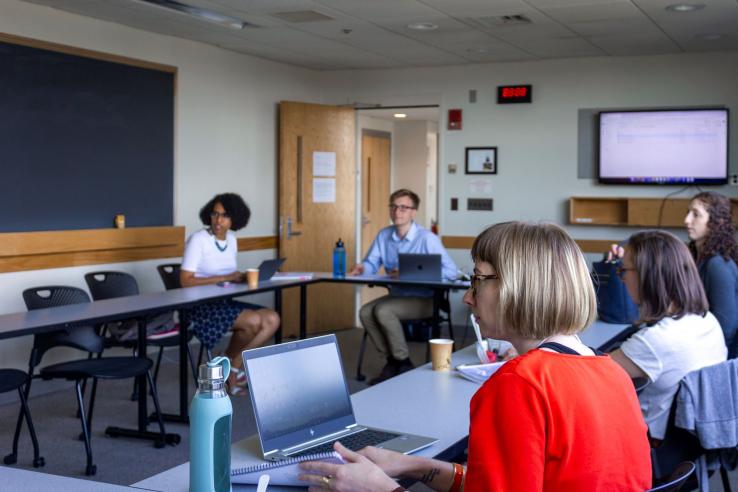J-PAL/MIT Evaluating Social Programs Course, 2023

Course overview
This five-day, in-person training equips participants with the resources and knowledge to engage with impact evaluations of social programs. The interactive course provides an in-depth look at why and when randomized evaluations can be used to rigorously measure the impact of social programs, key considerations for their design and implementation, and how findings can inform evidence-based decision-making.
Lectures and case studies using real-world examples will prepare participants to apply learnings at their own organizations. The course covers both technical design aspects and practical considerations for measuring impact with a randomized evaluation. The immersive format enables participants to forge connections with peers and policy and research experts.
Thank you for your interest! Applications for the course are now closed.
To receive email updates on other upcoming J-PAL courses, subscribe to receive updates on course announcements.
Who is a good candidate for this course?
The course is designed for a range of participants from governments, non-governmental organizations (NGOs), international organizations, private sector companies, foundations, and beyond working in North America and around the world. This includes:
- Policymakers and decision-makers in government
- Leaders in philanthropy
- Program implementers and practitioners
- Monitoring and evaluation personnel in NGOs and international organizations
- Staff at academic and research institutions
The typical participant is a mid-career professional with an interest in incorporating randomized evaluations into their work to determine whether their programs are achieving their intended impact. Although not required, some familiarity with economics and basic statistical concepts is helpful. Not sure if you’re the right fit? Contact Therese David at [email protected] for more information.
Course format
J-PAL affiliated researchers from leading academic institutions and senior J-PAL staff with extensive experience implementing randomized evaluations will lead interactive lecture sessions on how to generate rigorous evidence to inform decision-making. By working through case studies and examples in small groups with the support of J-PAL staff, participants will solidify new lecture concepts and discuss how they might apply learnings to their work. Small group discussions with J-PAL staff and fellow participants in similar areas of work will also provide opportunities to engage with and learn from a network of peers. Participants will come away from the course with resources and materials to map out an evaluation strategy for their own programs and policies.
View a sample agenda for the course here >>
Course objectives
Participants can expect to:
- Gain a clear understanding of why and when a rigorous impact evaluation is needed and how randomized evaluations are designed in real-world settings;
- Develop a foundational toolkit for measuring impact that includes how to develop a theory of change and identify a measurement strategy;
- Gain insight for guarding against threats to the validity of evaluations, determining an appropriate sample size, and interpreting results;
- Learn strategies to maximize policy impact and assess the generalizability of research findings;
- Join a community of practice with other decision-makers who can provide support in the design and use of impact evaluations.
Former J-PAL course participants say:
“Great opportunity to design and receive feedback on our own evaluations.”
“Really enjoyed the teaching methods. The initial exposure to case studies was then solidified through lectures and small group work. The constant interaction kept students engaged throughout.”
“I enjoyed this training very much and thought the experience was excellent. I still am buzzing whenever I speak about it. There were many wonderful aspects: the working groups, the quality of the other students, the quality of the TAs and the seriousness and dedication of the training effort. It was absolutely first-class.”
“It’s a very useful course. Very practical. Very applied.”
Fees
Fees for the course vary depending on organization type and operating budget. Please refer to the table below to determine your course fee. Please note that participants paying by credit card will additionally be responsible for any associated service and payment processing fees.
| Organizations headquartered in high-income* countries | Organizations headquartered in low and middle-income* countries | |
| For-profit, foundation, or intergovernmental organization | $4,100 | $4,100 |
| Academic or research institution | $4,100 | $2,900 |
| National government | $4,100 | $2,900 |
| State, county, or municipal government | $2,900 | $1,800 |
| NGO (operating budget > $10M) | $2,900 | $1,800 |
| NGO (operating budget < $10M) | $2,300 | $1,800 |
* World Bank Income Categories
Note: Staff at academic institutions may qualify for tuition assistance from their institution (see, for example, tuition benefits at MIT).
Key information
- How can I apply? Applications for the course are now closed. Applicants will be notified of their application status via email.
- What is the application deadline? Applications will close on April 14, but as spots in the course are limited and applications are reviewed on a rolling basis, we encourage you to apply as soon as possible.
- What is the criteria for admission? Although we have no fixed requirements, selection for admission is based on applicants’ organizational responsibilities and organizations’ alignment with J-PAL’s mission of reducing poverty through evidence-informed policy.
- Where can I find more information on the course? For further information on J-PAL’s Evaluating Social Programs course, including frequently asked questions, please refer to our website.
- Who can I contact with questions? Please contact Therese David at [email protected] with questions about applying or details about the course.